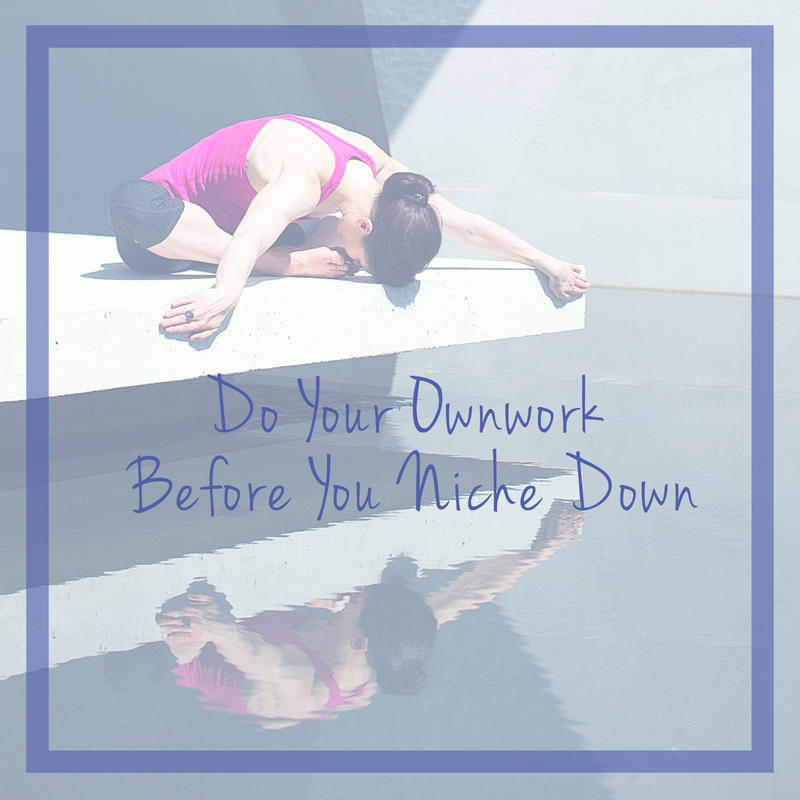Breaking News!
(Sorry, I just had to…)
Building a successful yoga business has nothing to do with how many Instagram followers you have.
It has nothing to do with how many classes you teach or how many students are in your classes.
It has nothing to do with how many trainings and certifications you have or whether or not you’re a member of Yoga Alliance, IAYT, or any other yoga groups.
It’s not even about how much money you make.
You can have all of those things listed above and be a crappy yoga teacher and you can have none of those things and be an excellent yoga teacher.
The million dollar question and my free answer
One of the questions I have been getting over and over again from my tribe of trusty teachers is this:
What does it really take to be a successful yoga teacher?
I’ve heard from so many of my colleagues how overwhelming and de-motivating (it’s a thing) it is to even begin to attempt to dream of building a successful yoga business. That’s a lot of false starts resulting in zero action.
Here’s why I think people are so overwhelmed. Heck, I’m overwhelmed and I’m doing it!
- There is a major lack of quality, truthful information about how to build a successful yoga business and a proliferation of major myths a la the get-rich-quick-sit-at-home-in-your-pjs-and-do-nothing-while-you-watch-the-passive-income-stream-in strategies. I can 100% guarantee you, or your money back, that this does not work.
- There are no good, accessible examples for us to build from in the yoga industry (accessible being the key word here because there are plenty of examples, they’re just not being actively promoted).
- Yoga teachers as a whole have an incredible lack of real support to help each other follow through on our projects and we have this weird aversion to mutually beneficial collaborations, probably because we have no models to follow (see #2).
So what are we going to do about it?
Well, I’m going to tell you what it really takes to build a successful yoga business based on my personal experience and the experiences of 50+ other full-time yoga teachers who I interviewed over the past year.
You are going to read these strategies and then choose to take action and do something to make your dreams come true. Deal?
Defining successful yoga business
Couple prefaces:
- By successful yoga business, I’m really talking about building a successful independent yoga teacher business. That means you aren’t going down the brick-and-mortar yoga studio ownership path (at least not yet).
- To have a successful yoga business you do not have to be a full-time yoga teacher. There is absolutely nothing wrong with building a viable, successful independent yoga teacher side hustle.
- What you are about to read is going to be different then what you’ve probably read before. Just sayin.’
- I’ve got a lot of ideas. So as not to overwhelm you, I’m going to be discussing each idea independently in separate blog posts to give you some breathing room and some time to digest, plan, and implement each strategy in your own life + biz. In other words, this is the first post of a longer series, so make sure to subscribe to my yoga teacher newsletter to get the latest updates. You can sign up over in the sidebar or at the bottom of this blog post.
The 8 key strategies (in order) for building a successful yoga business
I’ve thought a lot about these strategies and spent a good deal of time (years, really) experimenting, refining, and reverse engineering variations of the strategies below.
To be perfectly honest, in my own career I started with strategy #8 because marketing is my professional background. Starting there didn’t work because it resulted in zero revenue when I needed money yesterday.
If you had to ask me which is the most important strategy, I’m pretty convinced these days that it’s #6. No matter how the world changes, it always comes back to building solid relationships. But if you don’t have the foundational strategies in place listed before #6, you won’t be able to maximize this strategy.
I think #4 is the strategy most at risk because we get super sidetracked with all the other strategies. This is a huge industry-wide issue that we should all care deeply about if we care about the future of yoga.
Strategy #3 is the hardest, and you’ll find out why at a later date, so stay tuned!
I didn’t plan it this way, but it just so happens that this eight-strategy framework lines up quite nicely with the 8-limb path of Patanjali’s Ashtanga Yoga. So, there’s that 🙂
Just like the 8-limb path, there is intelligence and intention in the ordering at the same time that it’s not necessarily a linear system. In other words, while it’s important that each strategy builds on the last, you will move back and forth between them throughout your yoga career.
So, here it is:
- Define success
- Make a map
- Be a role model
- Focus on your craft
- Get clear on your message
- Build relationships
- Teach, teach, teach
- Strategize your social media marketing
Strategy #1: You have to define success
Today’s blog post dives into the first strategy.
The biggest and most powerful marker of success in your yoga teaching depends on how you choose to define success.
If you haven’t spent time contemplating what success means to you in general and in regards to your yoga teaching intentions, you’ll flounder aimlessly for the rest of your yoga teaching career. You’ll get frustrated, upset, and even jealous.
Try this right now. Ask yourself: “Based on everything I’ve done up to this point, do I consider my yoga business a success?”
Asked another way: “Am I where I want to be right now in my yoga business?”
How would you answer those questions?
If the answer is any variation of no, yes but, or I’m not sure/I think so, then you have some work to do on finding clarity around what success means to you.
If your definition of success is based on constantly comparing your achievements to those around you, you’ll never be successful.
If, on the other hand, you spend time thinking about what success really means to you, you’ll have a much easier, even enjoyable (!), time building your yoga business.
I have gotten plenty of criticism about not supporting all yoga teachers. Part of what I write about is teaching yoga full time because that is my personal choice and experience. My definition of success has to do with being a viable full-time yoga teacher because that is my passion. If you are fulfilled by the work you do already and all you want to do is share one yoga class a week with a group of dedicated students, I totally support you too.
You can be a wildly successful, incredibly gifted yoga teacher and teach part time!
You just have to be clear that is what you want.
There is nothing about teaching yoga part time that makes you less qualified or less worthy than someone who teaches full time.
But we’ll have different definitions of success. It does you no good to compare your achievements to mine and it does me no good to compare my achievements to yours.
We’re playing different games and we can all win.
There is no one definition of success
This all means that there is no one definition of a successful yoga business. There is not one road-map. You have to define success for your life circumstances and goals and you have to commit to that definition with unwavering conviction. That’s not to say that you can’t update your goals along the way, but you’ll always have your definition of success to measure your goals against.
Let me give you a couple examples.
Let’s say your definition of success is to make a certain amount of money, maybe $100,000/year as an arbitrary number, to support a lifestyle where you get to feel fulfilled by your work, support your family, and live in a home that is a decent size in a decent neighborhood with a great school system and access to a lot of cultural activities. Sweet. Now you have to figure out how your yoga business is going to make you $100,000/year and every decision you make in your business needs to point you in that direction if you want to be successful.
But maybe money doesn’t matter to you at all. Maybe your definition of success is to teach a few classes a week to serve an underserved population in your city so that you can help others suffer less. In return, you’d like modest compensation so that you can feel like you are actively contributing to the financial wellbeing of your family and the wellbeing of others in your community. Awesome.
You probably don’t need to make $100,000/year and you probably don’t even need to be teaching yoga classes at your local yoga studio. Everything you do in your yoga business will be geared toward helping you find those few classes a week that will help you serve those most in need in your community. You’ll negotiate compensation so that it feels fair for all involved, including you, and if you can meet all these criteria, you’ll feel successful.
Those are two very different yoga businesses and they can both be incredibly successful.
The biggest frustration in business comes from not being clear
Our frustration from feeling like we’re not succeeding stems from a lack of clarity on what success even means to us. We’re trying to succeed in our businesses based on some definition of success that “they” (no one ever knows who they really is) made up.
If we could all just pause for a moment and think about what success really means to us in our life circumstances, we’ll have a much easier time building a right-for-you business and won’t spend so much time worrying about whether or not we’re measuring up to our fellow yoga teachers.
It doesn’t matter if you aren’t making $100,00/year if money doesn’t really matter to you. So why are you worrying away years of your life trying to get there?
It doesn’t matter if you don’t have 30 people in your class if all you care about is providing incredible individual attention to your students. Don’t sweat it.
It doesn’t matter if you have 300,000 Instagram followers if teaching the ways of meditation is what you’re all about. Meditation doesn’t photograph well. I’ve tried it. Move on to a strategy that will have more impact instead.
Are you starting to see how foundational this strategy is? It will guide every other decision you make in your yoga business and yet so few of us ever stop to even think about it.
Now it’s time to do the work
Let’s be clear. It’s not like you’re just going to write down on a piece of paper right now what success means to you, post it on your bathroom mirror, and check the box for strategy #1. This is going to take some thought.
To make it easier for you, I’ve created a Successful Yoga Business Starter Kit that gives you actionable exercises, worksheets, and practical resources to help you implement these 8 strategies for yoga business success. Sign up below to get exclusive access to all these resources.
The first worksheet will help you define success on your own terms.





